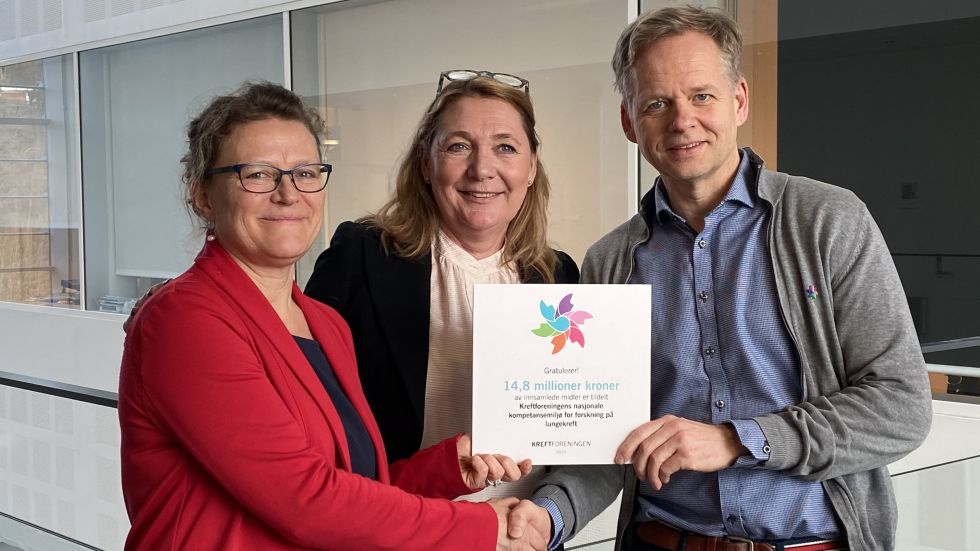The Norwegian Cancer Society grants 14.8 MNOK to a National Group of Expertise on Lung Cancer

Lung cancer is a common disease, with approximately 3400 diagnosed with lung cancer each year in Norway. The prognosis is poor, but new treatment alternatives have improved the prospects of subgroups of this patient group. With the funding from the Norwegian Cancer Society the group plan to investigate new treatment alternatives, elucidate the mechanism behind development of resistance and identify new biomarkers. Overall the projects will benefit the patients by accelerating the transfer of new and promising treatments into clinical care and ensure increased inclusion of lung cancer patients into clinical trials.
The expert group consists of partners from several of the major hospitals in Norway, including Oslo University Hospital, Ahus, Vestre Viken, Haukeland, UNN, St.Olav and Stavanger University Hospital in addition to the Cancer Register and the patient organization. Åslaug Helland, senior oncologist at the Department of Oncology at OUS, will coordinate the project.
The main objective of the project is to improve lung cancer prognosis and the funding will stimulate cooperation across different research disciplines and contribute to the translation of basic knowledge and methodology into knowledge that significantly can impact the lives of lung cancer patients.
The group will address several challenges including:
- Identification of new and effective treatment. Although major improvements have been seen the past years, more effective treatment options are important.
- Overcome resistance: Subsets of patients with non-small cell lung cancer are treated with targeted therapy and experience durable response rates. This includes patients with EGFR-mutations (~10% of NSCLC), ALK-alteration (~3%) and ROS1-alterations (1%). However, resistance always develops, and there is a desperate need for novel therapeutic strategies that circumvent resistance to treatment.
- Increased efficacy by better stratification. Many patients today respond well to immunotherapy, but unfortunately many do not respond, and overall, the prognosis is still poor. We do not have good predictive biomarkers for response to immunotherapy.
- Access to novel treatment through clinical trials. Many new and effective drugs are being developed, but usually years elapse from the first signs of effectiveness until the drugs are available in the public health care system. Inclusion in clinical studies provides access to new drugs for Norwegian lung cancer patients. In addition, it is known that clinical studies improve general patient care and improve prognosis for patients in general.
- Effective monitoring of patients. Improved methods for investigating tumour characteristics both in tumour tissue and in liquid biopsies are needed. Tumour biopsies can be technical difficult (and hazardous) to acquire in lung cancer. Biomarkers in blood samples would improve diagnostics in lung cancer as well as monitoring during treatment, and it may reflect tumour heterogeneity better than a small tumour biopsy. In addition, by adding circulating biomarkers to a lung cancer screening program, the specificity can be increased.
Links:
Read more fromABC Nyheter (in Norwegian):
Nasjonal ekspertgruppe får 14,8 millioner til lungekreftforskning: – Kan bidra til å endre synet på pasientgruppen
Home page of Åslaug Helland's research group:
Translational studies on solid tumours
